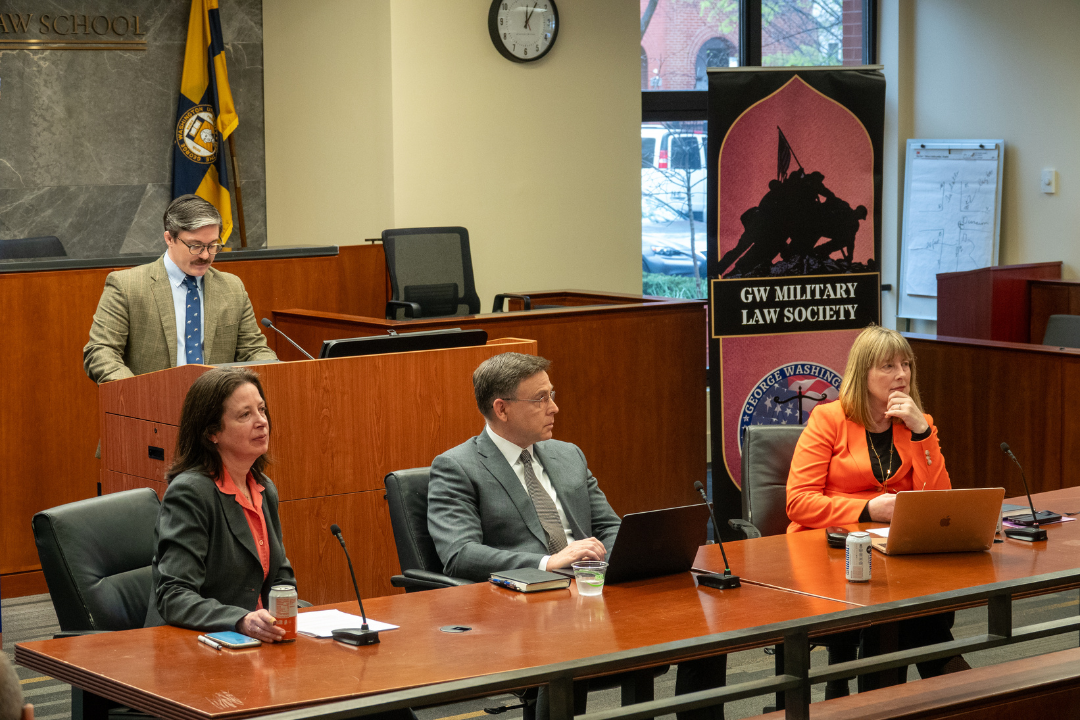GW Law's National Security, Cybersecurity, & Foreign Relations Law Program, along with the National Security Law Association (NLSA), Veteran Law Students Association (VLSA), and Military Law Society (MLS) hosted a panel discussion led by Oswald Symister Colclough Research Professor of Law, and Faculty Co-Director of the Program, Laura Dickinson, about her recently published book, Big Data and Armed Conflict: Legal Issues Above and Below the Armed Conflict Threshold (Oxford University Press, 2024). It is part of a series of books sponsored by the Lieber Center for Law and Land Warfare at the US Military Academy West Point.
Distinguished legal scholars and contributors to the book on the panel included Gary Corn, Program Director and Adjunct Professor, Technology, Law & Security at American University College of Law and retired Staff Judge Advocate, US Cyber Command and Fionnuala Ni Aolain, former UN Special Rapporteur for Counterterrorism and current Regents Professor and Ribina Chair in Law, Public Policy and Society at University of Minnesota Law School & Professor of Law, The Queens University of Belfast, Northern Ireland.
Professor Dickinson began the discussion by highlighting the book's overarching themes, defining big data, and explaining how big data relates to armed conflict. Professor Dickinson explained that big data is becoming increasingly relevant to the battlefield because data is both a tool and a target of armed conflict. She observed that data is an enormously complicated and expansive resource because civilian and military data are often commingled, military operations routinely use data, and data fuels artificial intelligence (AI). Further, Professor Dickinson noted that this is the first major book that grapples with the complex legal issues posed by the use of big data on the battlefield and that the book focuses on the three core international legal frameworks: the law of armed conflict (LOAC), the jus ad bellum, and human rights law.
Professor Dickinson framed the discussion by emphasizing that the growing use of big data on or adjacent to the battlefield poses many of what might be called “translation questions” for LOAC and other related bodies of international law. This often happens when new battlefield technologies such as cyber or AI emerge or when there are new contexts that arise such as transnational terrorism or increasing privatization. Professor Dickinson noted that, in the case of “big data,” one of the biggest challenges is how LOAC norms and principles translate to operations involving such data that have no real kinetic effects analogous to more traditional operations – for example, operations to delete or alter such data in battlefield operations. Are these operations attacks within the meaning of LOAC, and if so, how do rules that take into account civilian harm such as distinction and proportionality apply? Is LOAC adequate to address these types of operations? If not, what is the solution? Furthermore, Professor Dickinson noted that there are analogous questions under other bodies of international law such as the jus ad bellum, as to whether operations involving data trigger various thresholds. The chapter authors, Professor Dickinson explained, offer different answers to these questions.
After Professor Dickinson framed the book, Professors Corn and Ni Aolain discussed their contributions to the book’s big data legal analysis. Specifically, Professor Corn discussed how he analyzed the jus ad bellum’s governance of big data and identified issues regarding the jus ad bellum and big data. Likewise, Professor Ni Aolain discussed how she analyzed human rights law’s application to big data, and specifically, how counterterrorism offers a useful framework for analyzing big data and armed conflict issues.
Following these explanations, Professor Dickinson asked Professor Corn and Professor Ni Aolain to discuss whether they believe there are gaps in how their studied legal paradigms relate to technology. Both Professor Corn and Professor Ni Aolain agreed there are legal gaps in big data governance that nations must fill in, in the future and emphasized that big data and armed conflict is a burgeoning area of legal scholarship.
Finally, Professor Dickinson invited the audience to ask the panel questions about big data governance and armed conflict. Students, faculty, and staff asked numerous questions about big data, AI, cybersecurity law and policy.
Numerous students, faculty, and staff stayed after the event to thank all three scholars for their relevant work and participation on the panel. GW Law’s National Security, Cybersecurity, & Foreign Relations Law Program and its student organizations were honored to have Professor Dickinson moderate this panel discussion with distinguished scholars Professors Corn and Ni Aolain.


